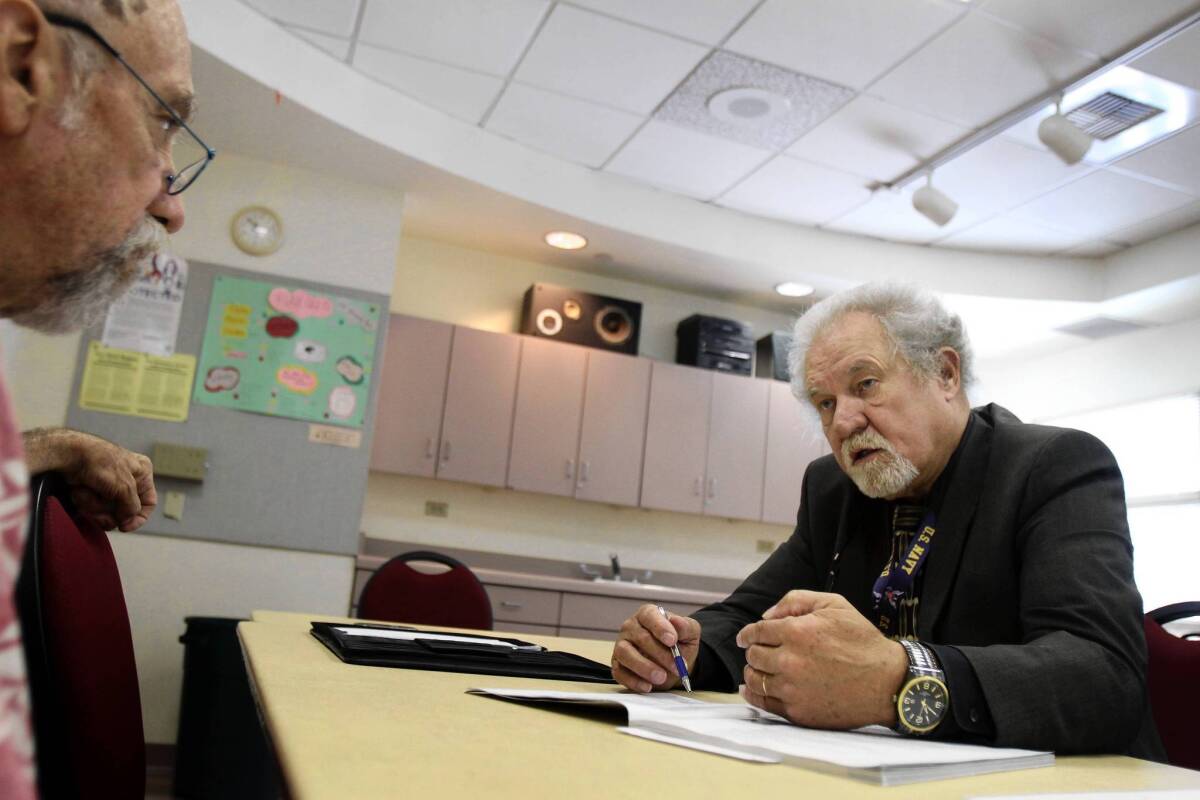How to avoid becoming a victim of Medicare fraud

- Share via
Lee Dorman gets a lot of phone calls from people who want to give him something. Recently, a man called saying he had a new Medicare card with Dorman’s name on it; all the 72-year-old retiree from Fountain Valley had to do was provide a little information.
“The person who talked to me claimed he was from Medicare. He said he needed to verify my Medicare information, Social Security number, my address, my phone number and my date of birth,” he said.
The caller dialed the wrong man. Dorman is a pro. He spends his days as a Medicare fraud counselor with Orange County’s Council on Aging, so he knew right away that the call was bogus.
“Red flags went up, and I said, ‘Is this a fraudulent phone call?’ ” The response to Dorman’s question was silence followed by a dial tone. “He hung up on me,” Dorman said.
Calls like the one Dorman received are common. Crooks are looking for access to Medicare numbers, which are used to fraudulently bill the government-run healthcare program for people with disabilities and people age 65 and older.
The callers will often tell seniors that they’re from the federal government or from Medicare. According to Glenn Ferry, a Medicare fraud investigator with the federal government, callers will make it sound official with statements like, “We’re going to send you a new Medicare card, so if you could verify your information real quick, we’d appreciate that,” he explained.
Sometimes seniors are even picked up in a van and taken to a clinic where they may get a few free services, but then Medicare is billed thousands of dollars in their names.
Whatever the scheme, Medicare fraud is rampant. Although exact numbers are not known, it’s estimated that between $60 billion and $90 billion is lost each year to Medicare fraud and abuse. Often a person’s information is stolen and sold by a current or former employee of a medical clinic or other facility, Ferry said.
Dorman’s experience provides a classic example of how an educated consumer can stop criminals in their tracks. Experts offer a few tips to avoid becoming a victim of Medicare fraud.
Protect your Medicare and bank account numbers. In most cases, your Medicare number is the same as your Social Security number, so you should guard it the same way that you would protect your credit card and your bank account numbers. “There can never be a fraudulent claim against Medicare unless a Medicare number is used as the basis for the claim,” said Micki Nozaki, complex case and volunteer coordinator with the California Senior Medicare Patrol, a group of highly trained volunteers who teach others about healthcare fraud.
Crooks are also after bank account numbers. The scammer commonly says he has the first few numbers of your account — a routing number to a local bank that is public information — and all he needs are the last few numbers.
“That gives the senior the idea, well, gee, that must be legitimate,” Nozaki said.
Nozaki also warns seniors to be on the lookout for people who approach them in a public place offering free services, medical equipment or a meal in exchange for their Medicare number.
Don’t fall for the call. What many people don’t realize is that Medicare will never call you. So anyone on the line telling you that they are from Medicare or the federal government is almost certainly lying.
“If you do get the call, you can easily hang up. Or you could just say, ‘Let me call you back later, let me get your name and number,’” said Ferry, head of the Los Angeles regional office of the U.S. Health and Human Services Office of Inspector General. If the caller won’t give up any information, that should be a red flag, he said.
And anyone offering to drive you someplace in exchange for cash, free medical equipment or services is attempting to defraud you. Don’t fall for it.
Keep track of your appointments. You can monitor your Medicare account for possible fraud by regularly reviewing the Medicare Summary Notice sent to beneficiaries every 90 days.
This is a document that summarizes the medical services you’ve received. But not all Medicare recipients get this. People receiving benefits through a Medicare Advantage plan will not receive this document.
“We always tell people to keep a diary of where you’ve been and what happened to you, so that when you do get the Medicare Summary Notice, you can do a comparison,” Nozaki said. You can also check your account online as often as you like at MyMedicare.gov.
If you identify something suspicious, it’s a good idea to check first with your doctor’s office to make sure an honest billing error isn’t the culprit.
Report suspicious activity. Fraud experts say seniors often are hesitant to report problems, but there are a number of good reasons to do so.
First, claims submitted for services or equipment that you don’t need may prevent you from getting care you will need in the future. “Trying to convince Medicare that you didn’t get the wheelchair … that’s going to be red tape that you’re going to have to deal with,” Ferry said.
In addition, a suspicious level of billing may cause Medicare to stop or deny payment on claims, some of which could be legitimate. That can leave you with large unpaid medical bills.
Dorman, the Fountain Valley retiree, jokes that by failing to give out his Medicare number to interested callers he’s missed out on a few million-dollar jackpots. In the end, though, he finds Medicare fraud no joking matter. “It’s pathetic that they get away with it.”
Resources and links
To cope with fraud, suspicious activity or billing issues: Senior Medicare Patrol California fraud hot line: 855-613-7080.
To report suspected fraud: Contact the Office of Inspector General at the U.S. Department of Health and Human Services: 800-HHS-TIPS or https://www.oig.hhs.gov.
To keep track of Medicare billing: MyMedicare.gov.
Medicare help: State Health Insurance Counseling and Assistance Program at Medicare.gov or 800-MEDICARE (800-633-4227).
Zamosky writes about healthcare and health insurance.
More to Read
Sign up for Essential California
The most important California stories and recommendations in your inbox every morning.
You may occasionally receive promotional content from the Los Angeles Times.






